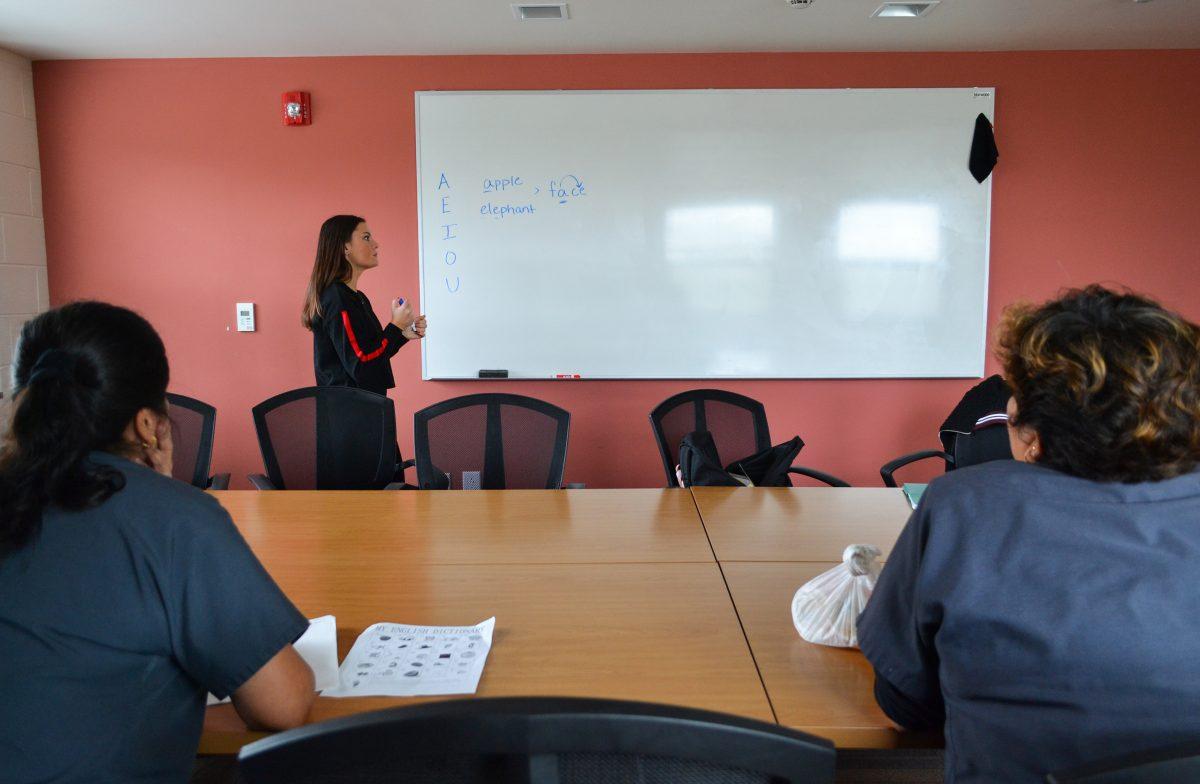Program part of advocacy efforts for workers
Este artículo es disponible en español aquí.
Lindsay Norton ’20 stood at the front of a conference room in Campion Student Center, pointing to a whiteboard where the time “12:30 p.m.” was written.
“Cómo se dice en inglés?” Norton asked. Two St. Joe’s workers at the back of the room quietly discussed possible answers. Then, one sat up slightly taller and responded, “12:30 or half past 12 in the afternoon.”
“Sí, bien,” Norton acknowledged. Norton, along with Maggie Maguire ’20 and Chase Bernier ’21, lead an English tutoring group for St. Joe’s workers every Friday in Campion. The event is coordinated by Campus Ministry.
The tutoring sessions were originally Norton’s idea. She had previously been involved in a program at her high school where she tutored local Spanish-speaking individuals at a parish near her school.
“When I spoke with Campus Ministry, we talked about how there are a lot of Spanish-speaking housekeeping workers here, and so that was a need right here in our community,” Norton said. “Once I started working with them, I saw how much of a need it was, especially just for basic communication with their boss. It’s really tough for them.”
The program, which is in its third year, also has ties to Hawks for Just Employment, a university group that advocates for the rights and proper treatment of university workers and that stresses the importance of building relationships with workers.
Beth Ford McNamee, assistant director of Campus Ministry, said the tutoring group is connected to one of the core missions of Campus Ministry: building community.
“It’s great to build community with people who normally wouldn’t get the chance to speak with them,” McNamee said.
That has been one of the positives for Bernier.
“I think I’ll gain a better knowledge of the people I’m working with, and for the other participants,” Benrier said. “We’ll gain a bond, a connection and a relationship.”
Carlo Cinaglia, visiting instructor of English as a second language (ESL), Spanish and linguistics, said English is especially challenging to teach and learn because it has so many exceptions.
“It’s almost like ‘okay, here’s the rule and here’s 10 examples of the rule, and here are the 40,000 exceptions you have to know,” Cinaglia said.
Despite these challenges, Norton said many of the workers in the group possess a strong desire to learn English, evidenced by their willingness to give up their lunch break to learn the language.
Cinaglia said he observes the same desire in many adult English learners he works with.
“One thing I’ve found with adult learners, while they do face difficulties with learning to pronounce things and learning new words, they make up for it or compensate for it with an extremely high motivation,” Cinaglia said.
Already, Norton said she has experienced some of the important “ah ha” moments that come with language tutoring.
“You can tell when something clicks for them, when they understand something,” Norton said. “It’s the best feeling.”
The workers in attendance also acknowledged the group’s benefits.
“They have helped in the daily life in my job and help me communicate with my boss and my co-workers,” said worker Gloria Flores through a translator.







































